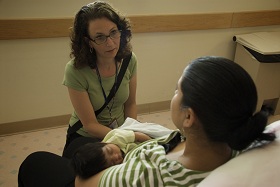Alumni distinction
Health promotion starts early: building health-care systems that are Baby Friendly

Maya Vasquez consults with a new mother.
(William Mercer McLeod/San Francisco General Hospital)
Editor's note: This story was first published in winter 2013. As of June 2013, Vasquez is graduate of the School of Nursing.
Betty Irene Moore School of Nursing at UC Davis graduate student Maya Vasquez has a powerful drive to give all people an equal shot at a healthy life, starting from their earliest days and regardless of their socioeconomic status.
Vasquez, a registered nurse, works to achieve this goal in her professional life by focusing on the health-care systems and support needed to promote a behavior that has far-reaching health implications for new mothers and their infants: breastfeeding. Her work is an example of examining health care from a systems perspective, because it requires the collaboration of interdisciplinary teams to address structural changes at several different levels.
Through the interprofessional Nursing Science and Health-Care Leadership Master’s Degree Program, Vasquez applies her expertise in maternal-child health and her passion for health equity to system-wide issues in the broader arena of health care for mothers and young children in the hospital where she works.
“I really believe that everyone deserves the very best care,” Vasquez said. “Putting better systems into place helps level the playing field for the disadvantaged.”
Vasquez works at San Francisco General Hospital, a care setting that serves a high percentage of low-income individuals. A former labor and delivery nurse, Vasquez is now a board-certified lactation consultant and the project manager for the hospital’s Baby-Friendly Hospital Initiative. The Baby-Friendly Hospital Initiative, launched in 1991, is an effort by UNICEF and the World Health Organization to ensure maternity facilities, whether free standing or in a hospital, become centers of breastfeeding support.
San Francisco General Hospital is the only Baby-Friendly certified hospital in San Francisco and one of only 150 Baby-Friendly certified facilities in the nation. A maternity facility can be designated 'baby-friendly' when it does not accept free or low-cost breast-milk substitutes, feeding bottles or teats and has implemented 10 specific steps to support successful breastfeeding.
“We know that breastfeeding is a low-cost, preventive method of improving child and maternal health while saving health-care dollars,” Vasquez said.
Despite the widely recognized health benefits of breastfeeding, low-income mothers may not have access to the knowledge and support needed to breastfeed successfully, Vasquez said. As a result, their children may miss out on some of the benefits of breastfeeding. In addition, there are some challenges to maintaining the Baby-Friendly status. For example, Baby-Friendly hospitals do not accept free formula from formula companies. Some facilities may be deterred from this effort because of the expense of purchasing formula for those mothers who are unable to breastfeed.
Vasquez helped San Francisco General Hospital achieve Baby-Friendly certification in 2007. Hospital employees launched the rigorous certification process a decade earlier, but Vasquez took the helm and saw the process through to completion. As a Baby-Friendly hospital, the perinatal clinical staff at the hospital receives extensive training that enables them to prepare expectant mothers to breastfeed and help new mothers to breastfeed successfully.
In her role as project manager, Vasquez trains physicians, nurses, medical residents and students in lactation support practices. She is also responsible for policy related to the program.
“Baby-Friendly practices are an example of looking at a variety of points of contact between patients and providers and determining how to improve these interactions across the organization,” Vasquez said.
As part of her graduate study, Vasquez uses the same systems perspective to examine the wider mother-and-infant services offered at her hospital. For her thesis, she is analyzing the facilitators and barriers to system improvement in this area.
“I want to take a 10,000-foot view of the perinatal system and examine system improvement from the perspective of the different players involved,” she said.
The goal of her research is to determine how the hospital can better serve expectant mothers so they choose to receive their prenatal care at San Francisco General.
Vasquez said she was inspired to attend the Sacramento-based UC Davis School of Nursing—even while working in San Francisco—because of the school’s emphasis on health-care leadership in the context of addressing health disparities.
Through the interprofessional graduate program, which is led by faculty throughout the UC Davis campus, Vasquez said she is encouraged constantly to think about, and do, her work in new ways.
“I see my work and health care in general in a much broader context than I ever did before,” she said. “I have a lot to learn, but I feel that the school has given me the tools to continue this journey.”





